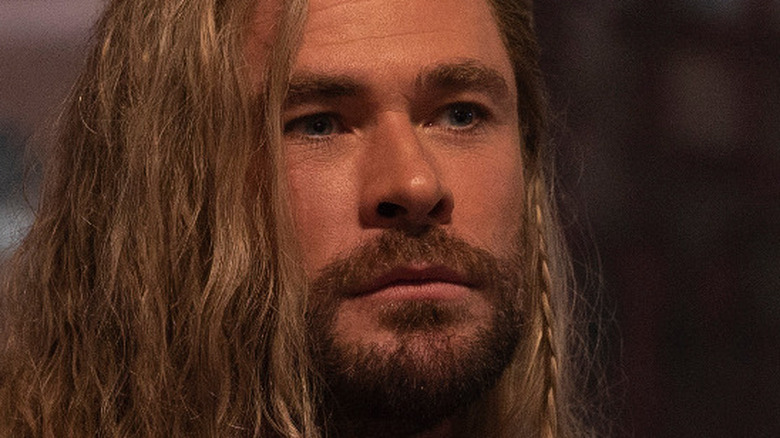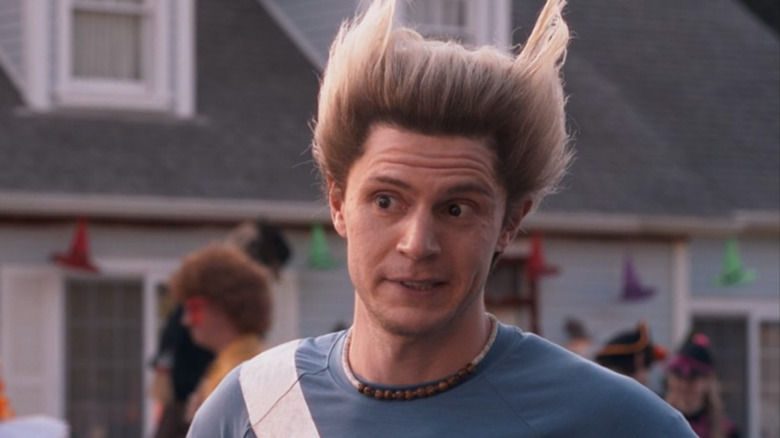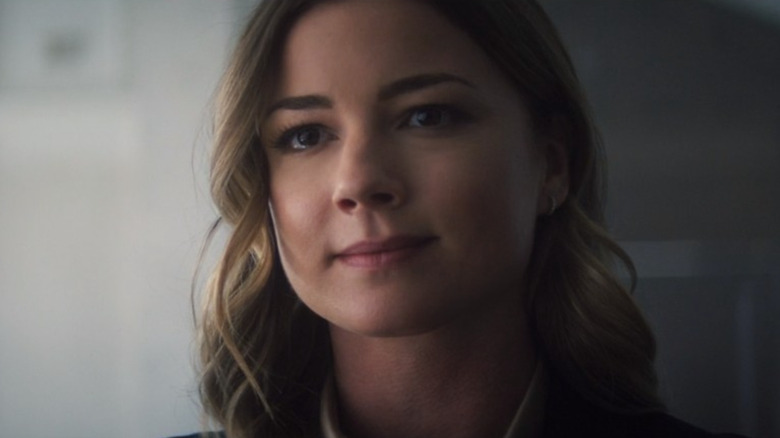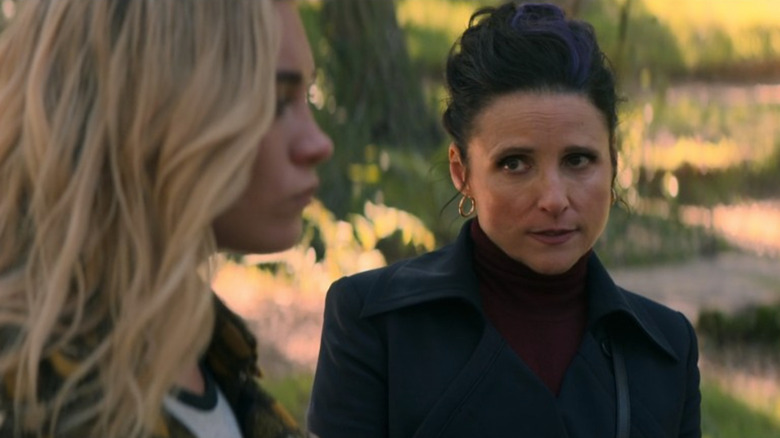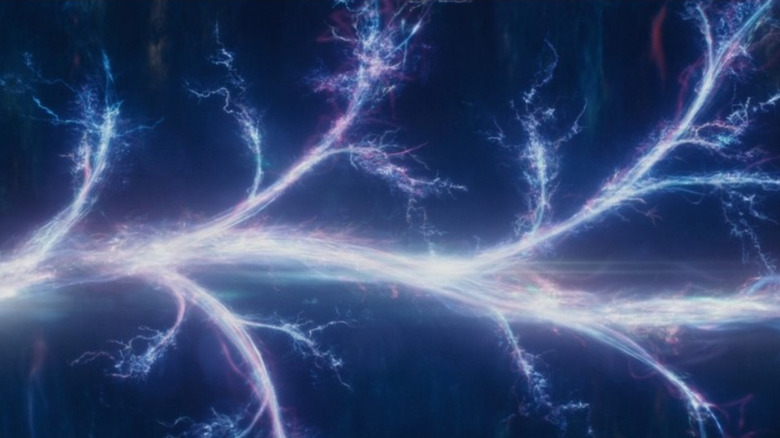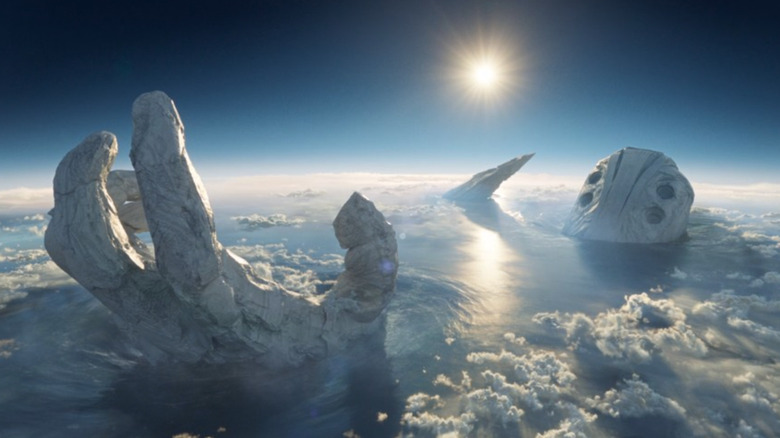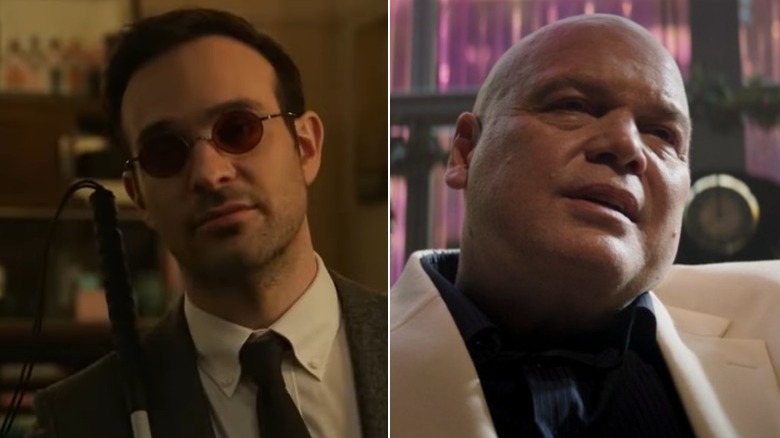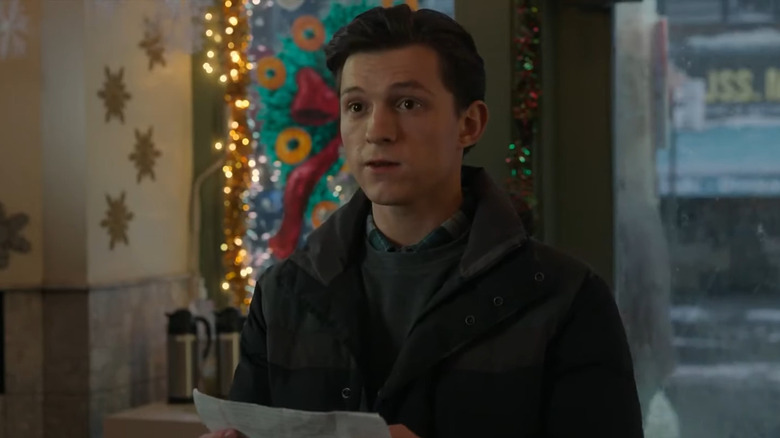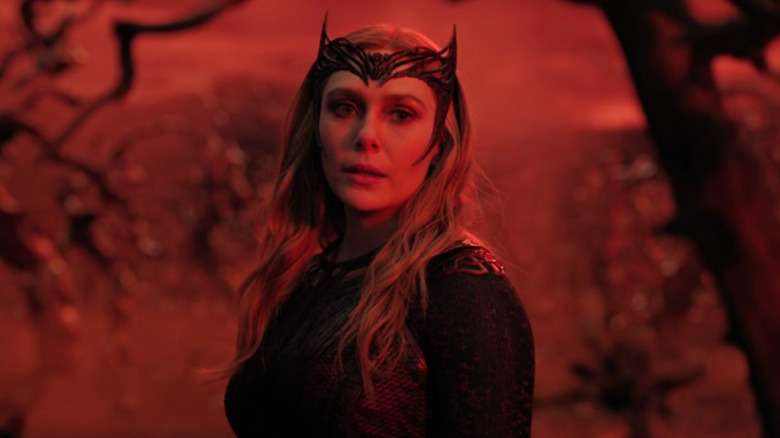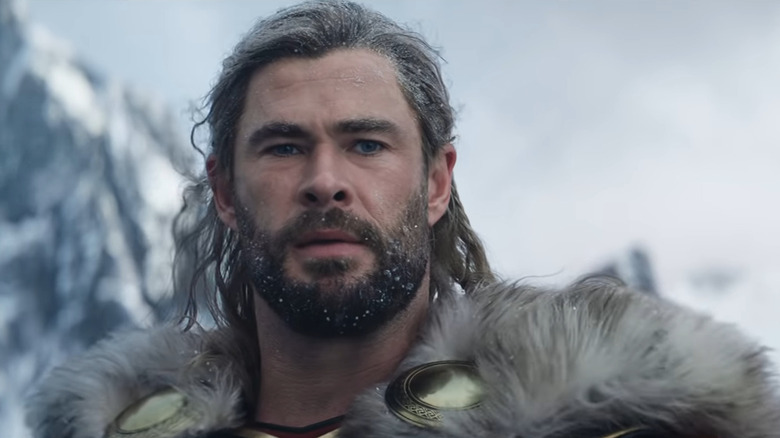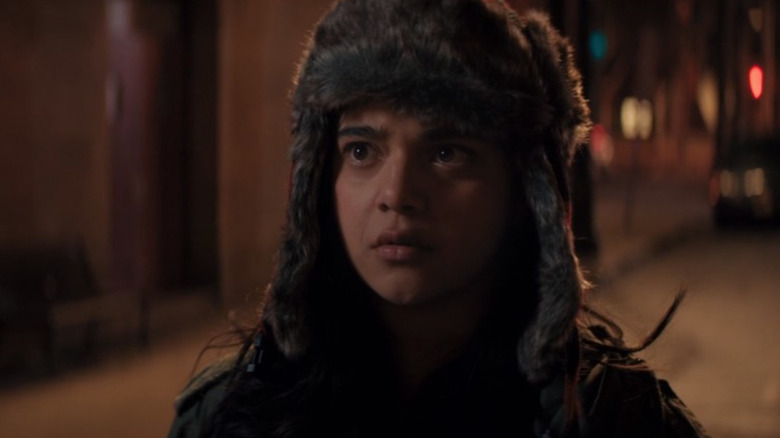Marvel's Phase 4 Surprises We Didn't See Coming
After more than a decade of increasingly profitable and narratively expansive blockbusters, culminating with the one-two punch of "Avengers: Infinity War" and "Avengers: Endgame," nobody would have blamed Marvel Studios for taking a few years to sit back and recuperate. Introducing (and in some cases, re-introducing) dozens upon dozens of wildly popular characters before killing off half of them, then using an elaborate time heist to resurrect the fallen, took fans of the franchise on an emotional roller coaster. The billions of dollars in box office returns would have been more than sufficient a reward for most studios. Then again, Marvel isn't like most studios, and as we've recently seen with the explosive reveal of its upcoming slate at the 2022 San Diego Comic-Con, it has no intention of slowing down.
Though the company did technically take a year and a half off after "Spider-Man: Far From Home" served as the epilogue to Phase 3, this was due to delays from the COVID-19 pandemic rather than the endlessly productive studio resting on its laurels. Once it did initiate Phase 4 with "WandaVision" (the first of many Disney+ shows), new installments of the Marvel Cinematic Universe began arriving at a rapid pace, with seven films and eight shows delivered within two years. As one might expect with so much new content, there have been a number of shocking revelations and developments that have whipped fans into a whole new frenzy. Here are the biggest surprises Marvel unleashed in Phase 4.
The Quicksilver fake-out
Wanda and Pietro Maximoff have always had an unusual relationship with the MCU, in that they technically also existed in 20th Century Fox's now-defunct "X-Men" universe due to a rights loophole (via Insider), which classifies their comic counterparts as both mutants and Avengers. While Empire magazine confirmed (via CBM) that Wanda never officially appeared in the "X-Men" films, her brother Pietro (aka Quicksilver) was brought to life via a sardonic and rambunctious Evan Peters. His popular interpretation of the character ultimately starred in three separate X-films, while the MCU version of the character (portrayed by Aaron Taylor-Johnson) only showed up in "Avengers: Age of Ultron," which both introduced and dispatched him in short order.
Despite his untimely demise, the specter of her brother's death weighs heavily on Wanda by the time we meet her in "WandaVision," which makes it all the more surprising when he suddenly shows up at her front door, seemingly back from the dead. Not only that, but he was now played by Peters rather than Taylor-Johnson, which immediately sent fans into a speculative tizzy. Theories about how this might signify the introduction of mutants into the franchise ran rampant for weeks, with the show playing coy about how this version of Quicksilver connected to what we'd seen before. The whole thing ended up being a massive misdirect, however: Peters' character was revealed to be an actor named Ralph Bohner, who was merely impersonating Wanda's brother at the behest of the villainous Agatha Harkness.
Sharon Carter goes rogue
One of the many recurring motifs of Steve Rogers' tenure in the MCU is his unfulfilled love affair with Peggy Carter, the woman he met and fell for shortly before being frozen alive. Though this loss hits Steve hard, he's given a small recompense via a new relationship he forms with Peggy's niece, Sharon, a cute neighbor who's revealed to be a S.H.I.E.L.D. agent in "Captain America: The Winter Soldier." Though Sharon provides aid to Steve where she can, and even risks her career to do so in "Captain America: Civil War," she's never able to successfully replace her aunt in his heart. Despite sharing a brief kiss, he ultimately abandons any potential romance with her when he uses time travel to reunite with Peggy.
When we next meet Sharon in "The Falcon and the Winter Soldier," she has been exiled due to violating the Sokovia Accords, and is making ends meet in the underworld of Madripoor and working under the mysterious Power Broker, who runs the island nation. Though she is initially willing to help Sam WIlson and Bucky Barnes in their quest to defeat the Flag Smashers, the final episode makes clear that she and the Power Broker are one and the same. Even after the U.S. pardons her, she seems committed to her newfound villainy, as she speaks to an unknown client about all the government secrets and technology she will now have access to.
Thunderbolts assemble
A common trope in Phase 4 has been the introduction of a new, potentially significant new character (usually played by a big-name actor) in a post-credits scene. These range from Harry Styles as Eros (aka Starfox, brother of Thanos) in "Eternals," to Charlize Theron as Clea (future lover of Doctor Strange) in "Doctor Strange in the Multiverse of Madness," to Brett Goldstein as Hercules (future rival of Thor) in "Thor: Love and Thunder." The first of these surprise inclusions has actually made two appearances thus far: Julia Louis-Dreyfus first showed up as Contessa Valentina Allegra de Fontaine near the end of "The Falcon and the Winter Soldier," then again shortly thereafter in "Black Widow."
Valentina works for a secretive, currently unknown organization that has an interest in enhanced individuals. Her two cameos have elicited excitement because of what they suggest for the future, as both hint that she's going around recruiting people (similar to how Nick Fury did back in Phase 1). She clearly has an existing relationship with Yelena Belova (Florence Pugh), manipulating her grief over the passing of her sister by setting her on a path of vengeance that's later resolved in "Hawkeye." She also offers to remodel disgraced former Captain America John Walker (Wyatt Russell) as the darker U.S. Agent. While the purpose of the team she's putting together is not clear yet, we will likely see the fruits of her efforts in the forthcoming "Thunderbolts" movie, which is set to close out Phase 5.
Sylvie unleashes the multiverse
Between the time heist that brings half the universe back to life in "Avengers: Endgame," to an increasing reliance on fake-out deaths to elicit tension (most recently seen with both Korg and Valkyrie in "Thor: Love and Thunder"), the MCU has often played fast and loose with the permanence of character deaths. No character has eluded the afterlife more frequently than Loki, who appears to perish in three different entries before meeting what seems to be a definitive end at the hands of Thanos. But even that can't keep the trickster god down, as an alternate version of him from the first "Avengers" manages to escape capture via the Tesseract, bringing him in direct conflict with the Time Variance Authority.
Over the course of "Loki," the title character teams up with Sylvie, a female Loki variant from another timeline, to unravel the mystery of the TVA, an organization that shuts down branching realities in order to preserve a "sacred timeline." These turn out to be the machinations of He Who Remains, a man whose variants discovered multiversal travel and ignited a war that threatened all realities. Exhausted from maintaining the sacred timeline, he asks Loki and Sylvie to either take his place, or kill him and unleash the horrors of the multiverse. Sylvie, whose life was destroyed by the TVA, is unable to quench her need for vengeance and kills him. The consequences of this will now form the basis of Phases 4 through 6, which Marvel has dubbed The Multiverse Saga.
Earth is a Celestial egg
Just because Marvel spends plenty of time with popular heroes like Spider-Man and Captain America doesn't mean they're not willing to experiment with slightly more obscure characters. This willingness to try new things worked like gangbusters when they released James Gunn's "Guardians of the Galaxy," as those characters have since starred in two sequels, a holiday special, and crossover appearances in the most recent "Avengers" and "Thor" movies. But perhaps their biggest gamble to date was introducing the Eternals, an eclectic family of space gods who have been sent to Earth by the Celestial Arishem to hunt down the vicious Deviants, and in the process wind up massively influencing human culture over thousands of years.
Halfway through the film, the real reason behind the Eternals' mission is revealed to Sersi (Gemma Chan), who has been chosen to lead them following the death of their previous commander. It turns out that Earth is actually a giant egg of sorts, that needs bountiful life in order to grow and eventually give birth to a new Celestial. In fighting the Deviants, the Eternals have enabled the world's population to grow and thrive, making the conditions right for this emergence. Despite some infighting over whether the population should be sacrificed in the name of this greater deity, the group eventually harnesses its collective powers to neutralize the Celestial before it fully surfaces, resulting in a gargantuan stone head and hand now sticking out of the Indian Ocean.
Daredevil and Kingpin are back
Well before the launch of Disney+, any TV projects connected to the MCU were spread out among various networks and streamers. The most popular of these was an interconnected set of shows on Netflix that adapted grittier, more street-level heroes, like "Luke Cage" and "The Punisher." The first and perhaps most enduring of these was "Daredevil," a series that put the unfortunate Ben Affleck movie in the rearview mirror with brutal action, noirish intrigue, and some iconic casting choices, particularly Charlie Cox as blind lawyer Matt Murdock and Vincent D'Onofrio as the nefarious Kingpin. Eventually, however, these shows were all canceled, and once the MCU started pivoting to Disney+ shows with bigger budgets and far more connectivity to the films, it seemed like they might be forgotten.
That is, until December 2021, when the MCU decided to reintroduce and fully incorporate these beloved interpretations of both characters. First, Charlie Cox made a brief cameo in "Spider-Man: No Way Home" as Peter Parker's lawyer, with his heightened other senses shown to be very much intact. Then, in the season finale of "Hawkeye," Vincent D'Onofrio made his return as the brutish mastermind behind the show's criminal element. Now that it's been confirmed that both characters will come back, first as supporting players in the "Echo" spinoff, then in a brand-new series called "Daredevil: Born Again," the future looks bright for fans of the Marvel Netflix era.
The world forgets Peter Parker
"Spider-Man: No Way Home" is a film with no shortage of surprises. Picking up from the previous film's jaw-dropping cliffhanger, which saw the villain Mysterio reveal Peter Parker's (Tom Holland) identity to the world, the beloved webslinger attempts to clear this up by coercing Doctor Strange (Benedict Cumberbatch) into making the world forget he's Spider-Man. A few too many tweaks to the spell result in a bevy of supervillains crossing over from the multiverse. But not just any villains: the film incorporates Spidey's enemies from previous film incarnations of the character, resulting in Willem Dafoe's Green Goblin, Alfred Molina's Doc Ock, Jamie Foxx's Electro, and more all coming out to play. Eventually even Tobey Maguire and Andrew Garfield's versions of Peter emerge to help combat this threat, much to fan delight.
But perhaps the biggest shocker, or at least the moment with the most lasting consequences, comes toward the end. Peter realizes that the only way to fix his mistake and prevent the multiverse from tearing itself apart is to have Doctor Strange perform a new spell, which will result in the world forgetting not just that he is Spider-Man, but forgetting the existence of Peter Parker full-stop. Not only is this a noble sacrifice worthy of the character, but it effectively wipes the slate clean and allows him to become a humbler, more street-level hero as he often is in the comics.
The Scarlet Witch is born
Wanda Maximoff, to put it lightly, has had a tough time of things since we first met her in "Avengers: Age of Ultron." Initially serving as an antagonist to the Avengers before ultimately joining their ranks, she has suffered a number of deeply personal losses in the time since. From feeling her brother being gunned down, to being forced to kill her lover in order to save the universe, to seeing him brought back to life only to be killed again, suffering has seemed to be her lot in life. No wonder she inadvertently creates a fantasy sitcom world in "WandaVision," just so she can reunite with Vision, experience the joys of motherhood, and briefly escape from a world that constantly brings her misery.
From its initial announcement, we always knew that Wanda would have a co-starring role in "Doctor Strange in the Multiverse of Madness," although the exact capacity of that role was left purposefully unclear in the promotional materials leading up to the film's release. As it turns out, her experience in Westview, the development of her true powers, and the influence of the Darkhold all conspire to turn Wanda into the devilish conjurer that comic fans always knew her to be: the Scarlet Witch. She has become so distraught and corrupted that she emerges as the primary villain of the film, quickly launching a bloody rampage through the multiverse — all so she can be reunited with her children.
Thor adopts a daughter
Few characters in the MCU have seen as much radical reinvention as Thor. After his first two films introduced him as a more stoic, Shakespearean warrior whose ostentatiousness was humorously juxtaposed against his fellow Avengers, he underwent a complete comic overhaul under the direction of Taika Waititi. His new vision for the character in "Thor: Ragnarok" turned the self-serious space Viking into a well-meaning goofball. The results were so successful that he became the first Avenger to receive a fourth solo film, with "Thor: Love and Thunder."
Despite his newfound comedic appeal, a number of dramatic developments have left the mighty hero (Chris Hemsworth) feeling adrift in the cosmos. His whole family has died, his home planet of Asgard was completely destroyed, and guilt over failing to stop Thanos in time caused him to sink into a deep depression. Even after rallying to defeat the Mad Titan, he is still unsure of his purpose in life. That is, until he's reunited with Jane Foster (Natalie Portman), his former lover who now wields his old hammer as a new version of Thor. His time with her ignites his passion for life and love once again, and even though she succumbs to cancer, Thor finds himself with new meaning when he agrees to adopt the daughter of his nemesis, Gorr. The film ends with Thor teaching the little girl the value of protecting innocents before they charge into battle together as a new super-team, appropriately known as Love and Thunder.
Mutants have arrived
Disney's acquisition of 20th Century Fox meant a great many things for the entertainment industry at large, but for Marvel fans it meant only one: that the rights to the X-Men, Deadpool, and the Fantastic Four had finally reverted back to Marvel Studios, who would surely be able to finally incorporate some of their most popular characters into the MCU. Legal logistics aside, however, it seems as though there hasn't been any real rush to do so. While the forthcoming reboot of "Fantastic Four" now has a release date, and early development on "Deadpool 3" has been discussed, very little is known about when we'll start to see mutants alongside the Avengers.
"Doctor Strange in the Multiverse of Madness" included a version of Patrick Stewart's Professor X that felt far more in keeping with the beloved '90s animated show, though this amounted to little more than a glorified cameo. However, the first concrete mention of mutants in the MCU has arrived from an unlikely source: "Ms. Marvel." In the final episode of the Disney+ series, Kamala Khan (who has developed energy-based powers passed down through her family and harnessed with an interdimensional bangle) is told by her science whiz friend Bruno that there's something unusual in her blood, specifically some kind of mutation. The use of this word, in conjunction with a musical cue riffing on the animated series' theme, leaves little ambiguity: Ms. Marvel (Iman Vellani) is officially the MCU's first proper mutant.
